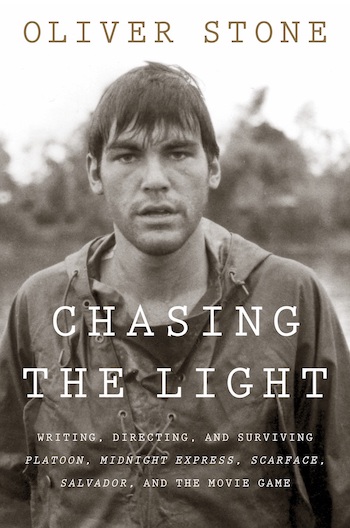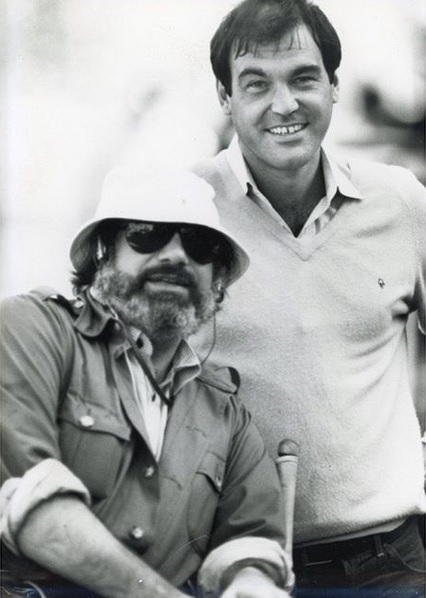"WHEN SCARFACE WAS IN TROUBLE" - EXCLUSIVE EXCERPT OF MEMOIR AT MOVIEMAKER - BOOK IS OUT TODAY
 "I saw [Scarface] for the first time in a packed theater on Broadway with a paying audience, mostly Latino and black, which gave the film street cred, and right there I knew it was a better movie than the film crowd thought — and that it would last." So says Oliver Stone in an exclusive excerpt today at MovieMaker "adapted" from Stone's new memoir, Chasing The Light, out today. "I knew it from riding the New York subways," Stone continues in the excerpt. "I knew it from hearing people talk on the street. I knew it from the people who shouted back at the film, who’d repeat the lines and laugh on the playgrounds and in the parks. These people knew it in their gut. The War on Drugs was bullshit from beginning to end, a fraud sending them to prison in massive numbers. These people knew that Tony Montana had a code of honor of his own, and as fucked up as he was, he was true to his nature till that end. He was a free man. I heard from his family years later that Pablo Escobar, the emerging king of cocaine at that time down in Colombia, adored it and screened it many times. And within a couple of years, the white folks who knew the drug world came to appreciate it. Michael Mann plunged right in with the TV series Miami Vice (1984). He saw the power of it, acknowledged it to me, and cashed in more than we ever did. By the time I made Wall Street in 1987, the young white guys down there were quoting it back to me at viewing parties.
"I saw [Scarface] for the first time in a packed theater on Broadway with a paying audience, mostly Latino and black, which gave the film street cred, and right there I knew it was a better movie than the film crowd thought — and that it would last." So says Oliver Stone in an exclusive excerpt today at MovieMaker "adapted" from Stone's new memoir, Chasing The Light, out today. "I knew it from riding the New York subways," Stone continues in the excerpt. "I knew it from hearing people talk on the street. I knew it from the people who shouted back at the film, who’d repeat the lines and laugh on the playgrounds and in the parks. These people knew it in their gut. The War on Drugs was bullshit from beginning to end, a fraud sending them to prison in massive numbers. These people knew that Tony Montana had a code of honor of his own, and as fucked up as he was, he was true to his nature till that end. He was a free man. I heard from his family years later that Pablo Escobar, the emerging king of cocaine at that time down in Colombia, adored it and screened it many times. And within a couple of years, the white folks who knew the drug world came to appreciate it. Michael Mann plunged right in with the TV series Miami Vice (1984). He saw the power of it, acknowledged it to me, and cashed in more than we ever did. By the time I made Wall Street in 1987, the young white guys down there were quoting it back to me at viewing parties. "The film would live on strangely in my life, an inside-the-park home run, an entrée to a certain wild, transgressive sector of our society. For years, people would congratulate me and quote me lines from it. Gangsters and their ilk would buy me drinks, champagne, in such faraway places as Egypt, Russia, Cambodia. I could’ve made a great deal of money by accepting a sequel, but my 'gangster' thoughts were ready to explode into the new milieu of Wall Street.
"Scarface was not The Godfather. It lacked the family and the sense of a tragic arc. But it was a juicy, crude opera of a drug dealer’s life set across a slimeball American materialism flowering in South Florida, the madness of a dream that always wants “more … more … and even more.” Greed was indeed good. The ’80s had arrived."
The above is only the last part of the excerpt-- read the full excerpt at MovieMaker. Here's the MovieMaker intro:
Before Scarface launched a boatload of T-shirts, posters, memes, and dubious imitations of Al Pacino’s cocainized Tony Montana, the film, written by Oliver Stone, was just a movie in trouble.In this excerpt from his new memoir Chasing the Light: Writing, Directing, and Surviving Platoon, Midnight Express, Scarface, Salvador, and The Movie Game, Oliver Stone recalls how he found himself caught between Pacino, Scarface director Brian De Palma, and Scarface producer Marty Bregman after a rough-cut screening of the movie that would soon become beloved as a classic of ’80s excess. Everything would work out, of course—in just a few years, Oliver Stone won the Academy Award for Best Director for Platoon, which also won Best Picture. Pacino and Bregman continued their long professional collaboration with Sea of Love and another De Palma film, Carlito’s Way.
De Palma’s next film after Scarface was Body Double, another very ’80s, freakishly watchable film that wasn’t an immediate success but has earned a ravenous cult following. And soon after he made another Al Capone-indebted gangster epic (one that got more initial respect than Scarface), The Untouchables. Stone eventually reunited with Pacino, this time as a director, in the adrenalized but surprisingly affectionate Any Given Sunday, another Miami-set tale of machismo, greed, and desperation.
Previously:

Updated: Wednesday, July 22, 2020 8:01 AM CDT
Post Comment | View Comments (1) | Permalink | Share This Post



